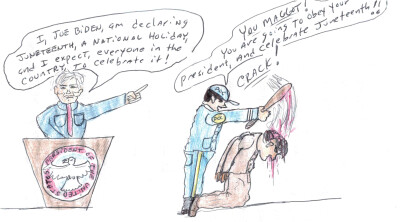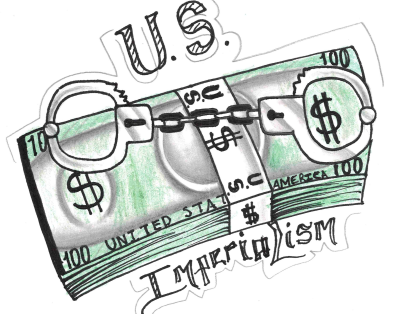From Victory to Defeat: China’s Socialist Road
and Capitalist Reversal
by Pao-Yu Ching
Foreign Languages Press
2019
In a recent online debate between two random “Marxist-Leninists” and
two fascists, one of the self-described “Marxist-Leninists” stated that
every country in the last 100 years has been socialist. The fascists are
happy to parade such meaningless dribble as “Marxism” so that they can
make Marxism look bad. With Obama’s election, white nationalist fear
became expressed in many derogatory words, including “communism” and
“Marxism,” with no sense of irony that they were accusing the number one
enemy of the world’s people of being a communist.
What is common among “Marxists” in the First World is saying every
country is socialist that says it is and has some form of state
intervention in the economy. This superficial analysis has also helped
muddy the water of what socialism is. And it allows the fascists to say
that they share many of the goals and ideals of the self-described
Marxists. In particular they both look to China as a positive model of
how to run a country and they both think Amerikans and various First
World European nations are being victimized by the current world system.
The fact that many of these fascists have chauvinist anti-Chinese views
and wish war against the social-imperialist CPC is of no matter. For
MIM, the question of whether today’s China is socialist or
social-imperialist is a dividing line question.
To understand what socialism is, MIM has long recommended The
Chinese Road to Socialism by Wheelright and MacFarlane. For the
history of the coup that overthrew socialism in China MIM distributed
The Capitalist Roaders Are Still on The Capitalist Road. In
1986, MIM cadre Henry Park published “Postrevolutionary China and the
Soviet NEP” comparing state capitalism in the early days of the Russian
revolution to state capitalism after the coup in China. In 1988, Park
published “The Political Economy of Counterrevolution in China:
1976-88”, which tied all of these subjects together through a Maoist
framework and analyzes the failures of state capitalism in post-Maoist
China.
Pao-Yu Ching’s From Victory to Defeat serves as a more
up-to-date introduction to the topic of the differences between
socialism and capitalism in the last 100 years of Chinese history. It is
written as a sort of FAQ and provides a broad overview, while explaining
the key concepts that allow us to differentiate between the two economic
systems. As such, MIM(Prisons) recommends Pao-Yu Ching’s work as a solid
starting place when exploring this topic. The topic of “What is
socialism?” must be fully grasped by all communists.
It seems that Pao-Yu may disagree with the Maoist class analysis. In
eir introduction ey states, “Today the living conditions of the working
masses in imperialist countries have grown increasingly difficult.”(p.9)
Ey then alludes to rising prices, rising debt and precarious work, none
of which necessarily reflect worsening objective conditions. Without a
recognition that these populations are parasitic on the working classes,
this line leads to the politics of the fascists and social-fascist
“Marxist-Leninists” mentioned above. It is also relevant to the question
of revisionism in the formerly socialist countries who looked to emulate
the lifestyles of Amerikans. Since this point is not taken up in the
rest of the book we will not dwell on it here, but it remains the
biggest problem with this work.
What is Socialism?
Many of our readers and those who are interested in what we have to
say in general are still confused as to what socialism is for the
reasons mentioned above. Ultimately it is defined differently by
different people, and it is used politically rather than scientifically.
Pao-Yu outlines what the most advanced example of socialism looked like
quite nicely in eir short book, so we will just mention some key points
here to help clarify things.
Socializing industry first required that the state took control of
the means of production in the form of factories, supply lines, raw
materials, etc. This is where many stop with their definition of
socialism. Some other key things that Pao-Yu points out is that success
was no longer measured in the surplus produced but rather on
improvements in the production and overall running of the
enterprise.(p.20) This recognizes that some will be more profitable in a
capitalist sense, but that the nation benefits more when all enterprises
are improving, not just the profitable ones. Another key point is that
laborers were guaranteed a job that was paid by the state at a standard
rate.(p.28) This eliminated labor as a commodity that you must sell on
the open market. Commodities are at the heart of capitalism. Socialism
is the the transition away from commodities, starting with the most
important commodity of humyn labor.
The above only applied to a minority of the country, as the vast
majority of China was a peasant population. It is only in recent years
that the peasantry is now less than half the population. It is in the
countryside where the capitalist roaders and the Maoists disagreed the
most. Pao-Yu walks us through the different phases of the transition to
socialism and how the principal contradiction shifted in each phase. Ey
explains the contradiction amongst the countryside, where production was
not owned collectively by the whole population, and the cities where it
was. The disagreement with the capitalist roaders was a disagreement
over the principal contradiction at the time, which they thought was the
advanced social system (of socialism) with the backward productive
forces (of small scale farming by peasants). To resolve this
contradiction the capitalist roaders thought they must accelerate
production, industrialize agriculture, and feed the industrialized
cities with the surplus of that agricultural production. This focus on
production is one of the key defining lines of revisionism.
While Marx taught us that the productive forces are the economic base
that define humyn history and the superstructure, he also said the
contradiction with the relations of production is what leads to
revolutionary transformations of society. As Pao-Yu points out, learning
from Mao Zedong, during these revolutionary periods is when the
relations of production become primary, in order to unleash the
productive forces that have become stagnant under the previous mode of
production.(p.30) In other words peasants living under semi-feudalism in
China pre-liberation were not improving their conditions. They needed to
revolutionize how they related to each other, how they were organized,
specifically the class relations, in order to move towards a new mode of
production (socialism) that could meet their needs much better.
Therefore Mao focused on education, theory, class struggle, culture, the
people, instead of focusing on production, profitability, surplus, and
wage incentives, as the capitalist roaders did. The Maoist path took the
Chinese peasants through a gradual process of increasing
collectivization through communes, which was quickly dismantled after
the coup in 1976.
What is Democracy?
Another question those living in bourgeois democracies often ask is
how you can have democracy with only one party, where people are purged
for having the wrong political line? Pao-Yu makes the point well by
explaining that in established bourgeois democracies you can have many
parties and many candidates, because they all represent the same
class.(p.48) This is the case because these countries are stable in
their mode of production (capitalism). In the transition to a new
economic system the political struggle is between two classes. In the
case of capitalism transitioning to socialism, it is between the
bourgeoisie and the proletariat (and their class allies on each
side).
The bourgeoisie by definition is always competing amongst itself, so
it cannot have one party represent all of their interests, except in
extreme crises when fascism becomes viable. In the United $tates today,
the left-wing of the bourgeoisie are represented by the democrats while
the right-wing flock to the republicans. Even amongst these parties are
different bourgeois factions fighting amongst each other. The
proletariat however is united in it’s class interest, so there will be
no need for multiple proletarian parties. There are many books that
outline the components of socialist democracy where people select their
representatives at each level of administration, where free speech and
criticism are encouraged, where education is universal and free and
where everyone is involved in studying theory and practice to shape the
decisions that affect their day-to-day lives. It does not require having
multiple political parties to choose from as bourgeois democracies do in
their electoral farce.
What is China?
Pao-Yu covered China before, during, and after socialism so that the
reader can better understand the differences. As such the book is a good
introduction to the explanation of why China has not been on the
socialist road since 1976. Ey touches on the loss of the guaranteed job,
with the introduction of temporary workers, the ending of the right to
strike and free expression among the workers, the ability of managers to
start keeping the profits from the enterprises they oversee, the loss of
universal medical care, and the focus on production for other nations,
while importing the pollution of those consumer nations. Ey briefly
documents the struggles of the workers to maintain control of the
enterprises they once owned collectively. China is now a capitalist hell
hole for the majority objectively and it does not matter whether the CPC
has millions of cadre who believe the opposite subjectively.
The Global Economy
One point Pao-Yu makes that we have also stressed as being important,
is the role of the proletarianization of the Chinese masses in saving
global imperialism from crisis. When the imperialist economies were
facing economic crisis in the 1970s, one third of the world’s population
was not available to be exploited by the imperialist system. One of the
laws of capitalism is its need to always expand. When China went
capitalist, it opened up a vast population to exploitation and
super-exploitation for the imperialists. This labor was the source of
value that the imperialist system thrived off of by the mid 1980s until
just recently.
Interestingly, Pao-Yu says that almost 30% of the Chinese population
is petty bourgeoisie, owning (often multiple) investment properties and
traveling around the world.(p.111) In a previous article we explained
that we saw China
as a proletarian country still despite its imperialist activities.
We referred to Bromma’s
research that stated China’s “middle class” was 12-15% of the
population some years prior. It is interesting to hear that the
Chinese petty bourgeoisie has reached the same size in absolute numbers
as the Amerikan one. It would be interesting to compare the wealth of
these two groups, we presume the Amerikans remain wealthier. Of course,
China is still majority proletariat, while Amerika is almost completely
bourgeoisified, so the class interests of these nations overall remain
opposed to one another. But we will rarely hear the proletarian voices
from China until a new proletarian party rises there.
The housing market is one example of how China has emulated the
United $tates. Investing in properties has become an important way for
the new petty bourgeoisie in China to accumulate wealth without working.
Just last week, the Chinese investment firm Evergrande made headlines
when it became public knowledge that they would not be able to pay the
billions of dollars they owe. Evergrande has significant backing from
Amerikan finance capital, as is true for the Chinese economy in general.
Therefore the collapse of the Chinese housing market could have real
ripple effects in the global economy.
The fact that real estate investment firms exist in China, and that
they are defaulting on hundreds of billions of dollars owed, is really
all you need to know to see that the economy is oriented towards profit
and not people. Things like inflation and bubbles and stock markets and
speculation just didn’t exist during the Maoist era. The reintroduction
of these things for the last four decades destroyed the progress in
class struggle in China long ago.










